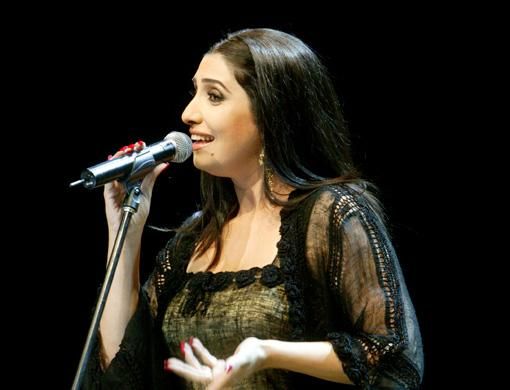Lebanese singer Ghada Shbeir, winner of this year's BBC 3 World Music Award 2007 for the album Al Muwashahat, performed last Wednesday at the Emirates Palace Hotel, Abu Dhabi.
Shbeir is known for her traditional Middle Eastern folk and Arab-Andalusian songs, Syriac and ancient Maronite and religious chants.
tabloid! caught up with the singer for a quick chat:
How did you begin your career?
I've always had a passion for singing. When I was nine years old I used to sing without accompaniment. I still sing a cappella to this day. As early as that, I knew I wanted to sing. After high school and university, starting a career in music seemed the most natural thing to do.
Tell us about your journey so far.
Some of the milestones I'm proud of include the music certificates I have gotten over the years; from my bachelor's degree and diploma to my master's and doctorate degree. I'm also quite proud of some of the awards I have won, particularly the ones I received from Egypt (Third World Festival of Arabic Music Award, Cairo, 1997) and London (BBC 3 World Music Award, 2007)
What was the low point of your career?
I remember vividly how dissatisfied I was with my performance during my concerts in Lebanon throughout the Civil War. I didn't feel very creative at the time.
What is special about your music?
I believe it's the selection of songs themselves, coupled with my enthusiasm and love of singing that adds a special touch to my music.
What do you feel about awards? What is your most cherished award?
I have received many awards from people and musicians around the world in appreciation of my work, and these, along with my passion for music and singing, give me the confidence to go on. In the future, I'd like to win an award from my country, Lebanon, once the political situation stabilises.
What do you prefer, recording or live concerts?
I prefer to sing live rather than to record in a studio. I take great pleasure in performing before an audience and in showing my passion through my singing.
What do you think about other Arabic singers such as Nancy Ajram and Haifa Wehbe?
Their music is very different from mine. I believe they are good at what they do as well.
Which is your favourite instrument?
The oud is my favourite musical instrument. I feel it goes in harmony with my voice.
What is the best compliment you ever received?
Someone once said, "The way I would describe her [me], is that she chants even when she is not singing."
Who is your favourite male singer?
I love listening to many remarkable singers, but if I had to choose one, I would say Wadeeh Al Safi.
How important is a music video in the success of a song?
The video is vital to the success of the song. It is risky to the singer because it creates an image of the singer that might not have anything to do with his or her voice and artistic talent.
Do you think Arabic music videos are getting too racy?
I believe that being racy is not a bad thing as long as it has a connection to the theme of the song. But I think it's becoming too much of a trend these days.
Songs she sang
Ghada Shbeir sang 16 songs and took time to explain the theme, composer's motive behind each script and brief story of the oriental Muwashah (Andalusian Melody), poetry and songs.
Dawr: Ana Haweit (I Fell In Love)
Muwashah: Ya Tara Ba'ad Al Bu'ad (What After Parting?)
Muwashah: Kullama Romtu Ertishafan (Whenever I Wanted to Sip Love)
Muwashah: Ahwa Qamaran (I Love a Moon)
Muwashah: Quma Bina Hanalhamiya (It's Time We Go)
Muwashah: Sohtu Wajdan (I Cried of Fondness)
Muwashah: Ya Hamam (Oh Pigeons!)
Muwashah: Ya Man Hawa (The Ineffable)
Muwashah: Esqineeha (Give Me a Drink)
Muwashah: Monyati Azza Istibari (I Grew Impatient)
Taqtuqa: Efrah Ya Qalbi (Have a Joy My Heart)
Poem: Ya Jarat Alwadi (A Valley Town)
Song: Farraq Mabenna Leih El Zaman (Why Destiny Got Us Parted?)
Taqtuqa: Shid El Hizam (Fasten Your Belt)
Poem: Modhnaka Jafahu Marqaduhu (Your Lover Gets Insomnia)
Taqtuqa: Ahudallisar (That's What Happened)
Awards
Here are some of the awards bestowed on Ghada Shbeir:
BBC 3 World Music Award, 2007 Al Bustan International Festival of Music and the Arts Certificate, 2002
Al Bustan International Festival of Music and the Arts Certificate, 2000 Third World Festival of Arabic Music Awards, Cairo, 1997 Philippe Akiki Award from the Ghosta community, 1997
Shbeir live
Shbeir live












